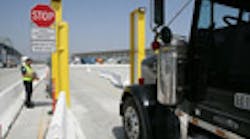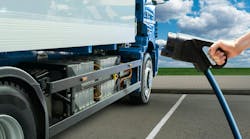The Long Beach Board of Harbor Commissioners voted unanimously to approve the Clean Trucks program aimed at modernizing the fleets that service the Port of Long Beach, CA, in an attempt to cut truck-related air pollution there 80% by 2012.
According to the board, only “clean” concession trucks will be able to work at the port, which has imposed clean truck, maintenance, security and health insurance requirements as well as finalizing a $2 billion subsidy program for the lease or purchase of clean trucks.
"Today, the Port has taken a monumental step to improve air quality and protect the health of the entire community," said Mario Cordero, president of the Long Beach Board of Harbor Commissioners. "We have worked closely with many community, environmental and business groups, and this plan incorporates their strongest ideas. This is the most ambitious, far-reaching clean-air plan ever undertaken by any seaport."
Other elements of the clean trucks program include the postponement of the start date for the collection of the Clean Trucks cargo fee until Oct. 1, 2008; linkage of the $35 twenty-ft container unit fee with a $15 infrastructure cargo fee; and an exemption of the cargo fees for owners who use clean trucks without Port financing.
The board plans to offer one-time financial incentives to truck operators to help with the purchase of newer trucks while getting older, less environmentally friendly models off the roads. The Port is offering three different financial plans for operators:
· A lease-to-own program in which an applicant exchanges their older truck for a pre-approved new truck under a seven-year lease agreement, with monthly lease payments of $500-$700 and Port monthly payments of $800 to $1,400. At the end of the lease term, the port will provide 50% towards the purchase of the truck.
· An up-front purchase grant for which an applicant exchanges an older truck for a pre-approved new truck with a Port grant of $60,000 to $75,000 for a clean diesel truck or $90,000 to $120,000 for Liquefied Natural Gas (LNG) or other alternative-fueled truck.
· A one-time grant, up to $20,000, towards the purchase of retrofit equipment for 1994 to 2003 model year trucks in 2008 and 2009.
According to the board, the Port will grant five-year concessions to Licensed Motor Carriers (LMCs) that register their drivers and trucks with the Port and meet “clean truck” standards, for a one-time application fee of $250 in addition to $100 per year.
LMCs will also need to enroll in the federal Transportation Worker Identification Credential (TWIC) program, give preference to drivers with previous drayage service, tag vehicles with RFID devices, agree to scheduled maintenance, and provide proof that health insurance was made available to all its drivers, the board said.
In November 2007, the Long Beach and Los Angeles Boards of Harbor Commissioners approved a ban on pre-1989 trucks, which will go into effect Oct. 1, 2008. Only trucks built after 1993 will be allowed at the port beginning Jan. 1, 2010, and all trucks must meet 2007 federal emissions standards by Jan. 1, 2012.
The next month the board approved the cargo fees in an attempt to accelerate the replacement of the 16,000 drayage trucks that service the Port, to conclude when the entire fleet meets Clean Air Action Plan (CAAP) requirements. The Port of Long Beach does not own or operate the trucks that service its terminal.




